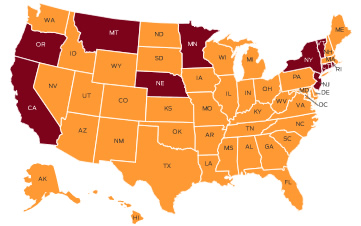Connecticut Ranks Third Among Least Tax-Friendly for Retirees
/
“The Constitution State is a tax nightmare for many retirees.” That is the thumbnail summary for Connecticut, which ranked third among the 10 Least Tax-Friendly States for Retirees, according to a list compiled by the business and personal finance publication Kiplinger’s.
Worst in the nation, according to the list, is Rhode Island, followed by Vermont, Connecticut, Minnesota and Montana. The publication used data from state tax departments, Commerce Clearing House and the Tax Foundation to develop the rankings. “Some states offer attractive tax benefits to woo retirees,” the publication indicated. “Then there are these ten states that are stingy with retirement tax breaks.”
Kiplinger’s pointed out that “Conneticut’s “real estate taxes are the second-highest in the nation, according to the Tax Foundation.” Rhode Island was described as “particularly tough on retirees,” and retirees in Vermont should “prepare to pay lofty taxes,” according to Kiplinger.
- Rhode Island

- Vermont
- Connecticut
- Minnesota
- Montana
- Oregon
- Nebraska
- California
- New Jersey
- New York
“When you're living on a fixed income, every penny counts, which makes these states particularly unwelcoming for retirees,” the publication noted. Most of the states tax at least a portion of Social Security benefits. Some also have higher-than-average income taxes. Others make up for low income and sales taxes with high property taxes. The survey also considered estate and inheritance taxes.
The tax friendliest state for retirees is Alaska, which has no income tax, no sales tax and no inheritance tax. Alaska is followed by Wyoming, Georgia and Arizona.
Connecticut’s high cost of living — more than 30% higher than the national average, according to Sperling’s Best Places. However, “high prices and taxes don’t deter retirees who like the scenery and who want to stay close to children, grandchildren and lifelong friends in the nearby metropolitan areas,” according to MarketWatch, a service of the Wall Street Journal, published this week. The data compiled by Kiplinger’s Senior Associate Editor was first reported last summer.
Kiplinger is a Washington, D.C.-based publisher of business forecasts and personal finance advice, available in print, online, audio, video and software products. The company’s best-known publications are The Kiplinger Letter, a weekly business and economic forecasting periodical for people in management, and the monthly Kiplinger's Personal Finance magazine.






























